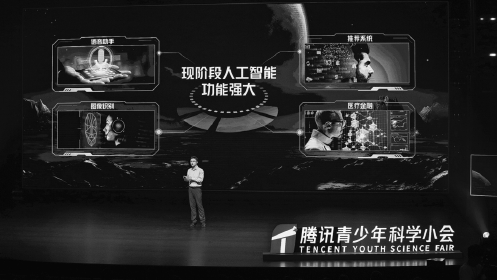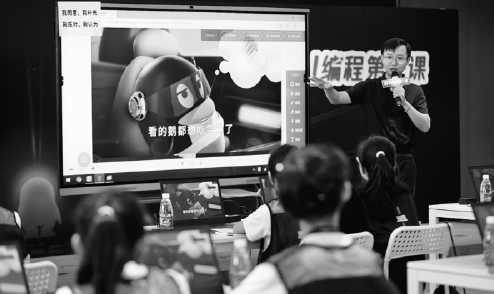Tomorrow's tech, today
Event at Tsinghua University in Beijing explores the growing influence of AI systems and the importance of computer science education, Li Yingxue reports.

Wang Yuanzhuo, a researcher at the Institute of Computing Technology, Chinese Academy of Sciences, who is focused on big data and artificial intelligence, gave a speech at the recent Tencent Youth Science Fair.
In doing so, he showcased a unique duality - he was not only participating in the live Q&A session on the Tencent Video platform,but also engaging in educational outreach for rural children at the same time, via a digital replica.
China's digital human technology only requires three minutes of real-person video footage to create an indistinguishable digital replica,which can assist individuals in managing tasks that cannot be carried out simultaneously.
Wang, who was also the scientific consultant for The Wandering Earth 2, envisions a future where, as technology evolves, the portrayal of self-aware digital entities akin to"Yaya" in the film will start to bridge the gap between fiction and reality.
"Every step in the evolution of human technology ultimately stems from our visions of the future. However, concurrently, the future presents a multitude of intricate issues and challenges," Wang said.
"I hope that all young people retain an everlasting curiosity for this world, maintain boundless imagination for the future, and are unafraid to dream beyond the conventional boundaries."
On Aug 20, the Tencent Youth Science Fair, organized by Tsinghua University, the China Soong Ching Ling Foundation, and Tencent, was held at Tsinghua University.
Themed Shaping the World with AI, the event offered a tailored One-Day AI Exploration Journey for young people and launched a public welfare project, First Lesson of AI Programming, for test operating.
Since it was founded in 2019, the event has attracted nearly 54 million young participants both online and offline.
As part of a special initiative associated with the 2023 National Science Popularization Day, the event brought together scientists from research institutions, higher education establishments and the artificial intelligence industry.
Shen Beili, vice-president of the China Soong Ching Ling Foundation, emphasized that enhancing the scientific literacy of young people is of paramount significance in bolstering independent innovation capability and laying a solid talent foundation for building a technologically strong country.
Throughout the event, experts in the field of AI were invited to engage in direct exchanges with young participants. "This event serves as a tangible way of strengthening youth science education,"Shen said.
According to Li Hang, vice-chairman of Tencent Youth Development Committee, their research, which is carried out in collaboration with the Chinese Association for Artificial Intelligence, revealed that nearly 70 percent of parents consider AI and programming to be highly important subjects for their children to learn. However, over half of the young individuals surveyed had not been exposed to education in AI.
Additionally, the research indicated that 54 percent of parents acknowledged the importance of introducing AI-related education within the context of home-based learning, yet only 0.9 percent of parents were able to implement this effectively.
The China Soong Ching Ling Foundation and Tencent are about to launch the mini program First Lessons in AI Programming to provide a foundation in both AI and programming literacy for youths across the nation, even those with no prior knowledge of the subjects.
Sun Maosong, vice-dean of the Institute for Artificial Intelligence,Tsinghua University, showcased Jiuge, an AI poetry composition model that he and his team have been developing since 2015, at the event.
According to Sun, poetry places emphasis on rhythm, symmetry,profound imagery, and rich, intricate semantic expression.
"Jiuge, drawing from an extensive dataset of classical poetry, was engineered to construct an automated AI poetry and couplet writing system, thereby overcoming the challenges of Chinese language comprehension and analysis in AI,"Sun explains.
With a seven-character quatrain composed using Jiuge, he helped young attendees appreciate the fascinating collision of traditional culture and cutting-edge technology.
Pan Jiaofeng, head of the Institutes of Science and Development,Chinese Academy of Sciences, pointed out that while China has made remarkable strides, a notable gap in AI foundational technologies remains, especially in AI hardware,in comparison to developed nations.
He encouraged the young participants to place emphasis on foundational subjects like mathematics,physics and neuroscience, to contribute to the establishment of an independent and controllable AI technology framework for China's future endeavors.


Today's Top News
- Xi chairs CPC leadership meeting to discuss draft 15th Five-Year Plan, govt work report
- China steps up preparations for crewed lunar mission
- China's import growth good for world trade
- HK to set up key industrial innovation site
- Major battery breakthrough paving way for EV upgrade
- Meetings promise shared growth






























